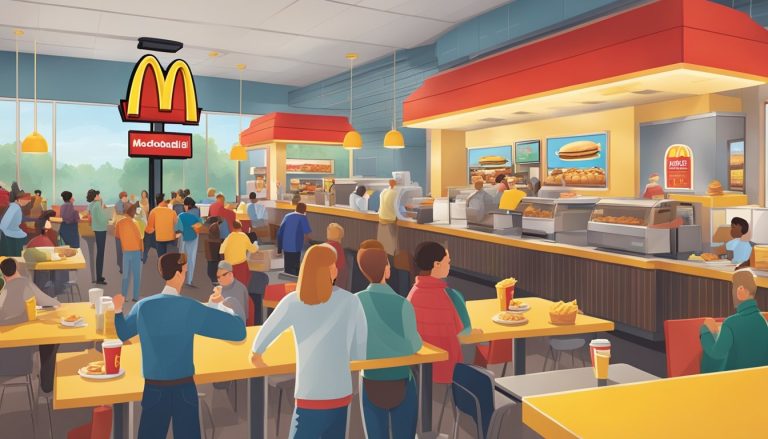Over the past decade, breakfast foods have undergone significant changes, reflecting shifting consumer preferences and culinary trends. McDonald’s, a major player in the fast-food breakfast market, has adapted its menu to keep pace with these evolving tastes. The traditional definition of “breakfast foods” has expanded beyond eggs and bacon to include a wider variety of options, from healthy smoothie bowls to indulgent croissant sandwiches.
This transformation has been driven by factors such as increased health consciousness, busy lifestyles, and a desire for more diverse flavors. McDonald’s has responded by introducing items like oatmeal, fruit parfaits, and McCafé beverages, catering to customers seeking healthier or more sophisticated breakfast choices.
The breakfast landscape continues to evolve, with new products and concepts regularly entering the market. As consumer expectations change, McDonald’s and other food industry players must stay innovative to meet the demand for convenient, tasty, and sometimes nutritious breakfast options.
The Evolution of McDonald’s Breakfast Menu
McDonald’s breakfast offerings have undergone significant changes since their introduction. The menu has expanded from a single iconic item to a diverse array of options available throughout the day.
Origins of the Egg McMuffin
The Egg McMuffin, introduced in 1972, marked the beginning of McDonald’s breakfast menu. Created by franchise owner Herb Peterson, this sandwich combined an English muffin, Canadian bacon, egg, and cheese. It quickly gained popularity and became a staple breakfast item.
The success of the Egg McMuffin led to the nationwide rollout of McDonald’s breakfast menu in 1977. This initial menu featured a limited selection of items, including hotcakes, toasted English muffins, scrambled eggs, sausages, hash browns, and danish pastries.
Expansion to All-Day Breakfast Offerings
In 2015, McDonald’s launched its all-day breakfast menu in the United States. This move allowed customers to enjoy breakfast items beyond traditional morning hours. The initial all-day menu included popular items like the Egg McMuffin, Sausage McMuffin with Egg, and hash browns.
The all-day breakfast proved successful, boosting sales and attracting new customers. However, it also presented operational challenges for franchisees. In 2020, McDonald’s temporarily suspended all-day breakfast due to the COVID-19 pandemic and streamlined operations.
Innovation and New Breakfast Items
McDonald’s has continuously innovated its breakfast menu to meet changing consumer preferences. The McGriddles, introduced in 2003, featured a unique maple-flavored griddle cake. In 2013, the Egg White Delight McMuffin debuted as a healthier alternative.
Recent additions include the Triple Breakfast Stacks in 2018, featuring extra meat and cheese. McDonald’s has also experimented with regional specialties and limited-time offers to keep the menu fresh and exciting.
The company has adapted to health trends by offering fruit and maple oatmeal and reducing artificial ingredients in its breakfast items. These innovations reflect McDonald’s efforts to maintain its position as a leading breakfast destination.
Cultural Shifts in Breakfast Consumption
Breakfast habits have evolved significantly over the past century, reflecting broader societal changes. These shifts have reshaped not only what people eat in the morning, but also when and where they consume their first meal of the day.
From Home-Cooked to Fast Food
The traditional home-cooked breakfast has given way to more convenient options. In the early 20th century, a typical American breakfast often included eggs, bacon, toast, and coffee prepared at home. As the fast food industry grew, chains like McDonald’s introduced quick breakfast items.
Hash browns, breakfast sandwiches, and coffee became popular grab-and-go choices. This shift aligned with changing work schedules and increased commute times. Fast food breakfast menus expanded, offering variety and speed to busy consumers.
Many households now rely on packaged cereals, granola bars, or yogurt for weekday breakfasts. These items require minimal preparation, catering to time-pressed individuals and families.
The Impact of Busier Lifestyles
Modern lifestyles have significantly altered breakfast routines. Long work hours and early start times have led many to skip breakfast entirely or eat on-the-go. This trend has sparked debates about the importance of breakfast for health and productivity.
In response, the food industry has developed portable breakfast options. Protein shakes, breakfast biscuits, and fruit smoothies have gained popularity. These items allow people to consume nutrients quickly, often while commuting.
Some workplaces now offer breakfast as an employee perk. This practice acknowledges the challenges of morning routines and aims to boost productivity and morale.
Global Influences on Breakfast Choices
International cuisines have broadened the American breakfast palette. Avocado toast, inspired by Australian cafe culture, has become a trendy breakfast item. Asian-inspired breakfasts like congee and miso soup have gained traction in urban areas.
Mediterranean-style breakfasts featuring olives, feta, and whole grains have appealed to health-conscious consumers. Mexican-inspired breakfast burritos have become staples in many regions.
This globalization of breakfast reflects increased travel, diverse populations, and a growing interest in international flavors. It has led to a more varied and creative approach to the first meal of the day, moving beyond traditional American staples.
Nutritional Considerations of Fast Food Breakfast

Fast food breakfast options can vary widely in their nutritional content. Some items provide essential nutrients, while others are high in calories, saturated fat, and added sugars. Understanding the nutritional profile of these foods is crucial for making informed choices.
Assessing the Health Impact
Fast food breakfast items often contain high levels of sodium, saturated fat, and added sugars. A typical breakfast sandwich can exceed 500 calories and provide over 25% of the daily recommended sodium intake. Many breakfast platters include processed meats, which have been linked to increased health risks when consumed regularly.
On the positive side, some fast food chains now offer healthier alternatives. Oatmeal, yogurt parfaits, and fruit cups provide fiber, vitamins, and minerals. Egg white options and whole grain bread choices can reduce calorie and fat content while increasing protein and fiber intake.
Adapting to Dietary Trends
Fast food chains are responding to consumer demand for healthier breakfast options. Many now offer plant-based alternatives to traditional meat products. These items often have lower saturated fat content and may provide additional fiber.
Protein-rich breakfast options are gaining popularity. Chains are introducing more egg-based dishes and protein-packed smoothies to cater to this trend. Some restaurants now display calorie counts and nutritional information, empowering customers to make more informed choices.
Despite these improvements, it’s important to note that many fast food breakfast items remain high in calories and processed ingredients. Moderation and careful selection are key when incorporating these foods into a balanced diet.
Consumer Expectations and Market Trends

Breakfast habits are evolving rapidly, driven by changing lifestyles and consumer preferences. These shifts are reshaping the breakfast food landscape and influencing product innovation.
Demand for Convenience
On-the-go lifestyles have fueled a growing demand for convenient breakfast options. Busy consumers seek quick, portable meals that can be easily eaten during commutes or at work.
Grab-and-go items like breakfast sandwiches, wraps, and burritos have gained popularity. Many fast-food chains now offer all-day breakfast menus to cater to this trend.
Ready-to-eat cereals and breakfast bars remain popular choices for their convenience. Meal replacement shakes and smoothies have also emerged as quick breakfast alternatives for health-conscious consumers.
Expectations for Variety and Taste
Modern consumers crave diverse flavors and cuisines in their breakfast choices. This has led to a fusion of traditional breakfast foods with global ingredients and cooking styles.
Ethnic-inspired breakfast items like breakfast tacos, shakshuka, and acai bowls have found their way onto menus. Plant-based options, such as vegan egg substitutes and dairy-free yogurts, are gaining traction among health-conscious and environmentally aware consumers.
Gourmet toast variations and artisanal breakfast sandwiches showcase the trend towards elevated breakfast experiences. Premium ingredients and unique flavor combinations are becoming increasingly important to discerning breakfast eaters.
Rise of Breakfast Snackification
The line between breakfast and snacks is blurring as consumers opt for smaller, more frequent meals throughout the day. This trend has given rise to “breakfast snacks” that can be enjoyed at various times.
Mini breakfast sandwiches, breakfast bites, and protein-packed snack packs are gaining popularity. These options cater to consumers who prefer grazing or eating multiple small meals rather than traditional sit-down breakfasts.
Portable yogurt drinks, breakfast cookies, and savory muffins exemplify the convergence of breakfast and snack foods. These items offer convenience and portability while still providing the nutritional benefits associated with breakfast.
McDonald’s as a Cultural Icon in Breakfast Evolution

McDonald’s has played a pivotal role in shaping breakfast habits and influencing popular culture. The fast-food giant’s breakfast menu has become synonymous with quick, convenient morning meals for millions worldwide.
Advertising and Brand Image
McDonald’s breakfast advertising campaigns have left an indelible mark on popular culture. The company’s catchy slogans and memorable commercials have made phrases like “I’m lovin’ it” and “ba da ba ba ba” instantly recognizable.
Television ads featuring the Egg McMuffin and other breakfast items have become cultural touchstones. These commercials often depict diverse groups of people enjoying McDonald’s breakfast, reinforcing the idea of inclusivity and universal appeal.
The golden arches logo, prominently displayed in breakfast ads, has become a global symbol of fast food and American culture. This iconic branding has helped McDonald’s maintain its position as a breakfast leader despite increasing competition.
The Role of Celebrity Endorsements and Collaborations
Celebrity endorsements have significantly boosted McDonald’s breakfast profile. Sports stars, actors, and musicians have lent their star power to promote various breakfast items, increasing brand visibility and appeal.
Notable collaborations include:
- Olympic athletes showcasing Egg McMuffins as a protein-packed start to the day
- Pop stars creating custom breakfast meal deals, appealing to younger demographics
- Local celebrities in different countries promoting region-specific breakfast menu items
These partnerships have helped McDonald’s stay relevant and connect with diverse audience segments. By aligning with popular figures, the company has reinforced its status as a cultural icon in the breakfast space.
Future Developments in Breakfast Offerings

McDonald’s and other fast food chains are poised to reshape breakfast offerings through technological advancements and evolving consumer preferences. These developments aim to enhance customer experience while addressing growing concerns about sustainability.
Innovations in Convenience and Speed
Mobile ordering and AI-driven personalization are set to revolutionize breakfast service. McDonald’s is expected to implement smart menu boards that suggest items based on weather, time of day, and customer preferences. Drive-thru lanes may incorporate voice recognition technology to streamline ordering processes.
Automated cooking systems could reduce preparation times and ensure consistency. 3D food printing may allow for customized breakfast items made to order. Grab-and-go options are likely to expand, with smart vending machines offering fresh, hot breakfast foods in high-traffic areas.
Sustainability and Ethical Production
Eco-friendly packaging is becoming a priority, with biodegradable materials replacing traditional plastics. McDonald’s is exploring reusable container programs to minimize waste. Plant-based alternatives to traditional breakfast meats are expected to gain prominence on menus.
Locally sourced ingredients may feature more prominently to reduce carbon footprints. Ethical sourcing practices, including cage-free eggs and sustainably raised livestock, are likely to become standard. Energy-efficient cooking methods and equipment will help reduce environmental impact in food preparation.
Transparency in ingredient sourcing and nutritional information will be emphasized through QR codes and augmented reality experiences for customers.
Conclusion
McDonald’s breakfast offerings have played a significant role in reshaping perceptions of traditional morning meals. The fast-food giant’s decision to serve breakfast items all day has challenged long-held notions about when certain foods should be consumed.
This shift has influenced broader trends in the food industry. Many restaurants now offer expanded breakfast menus throughout the day, catering to changing consumer preferences and lifestyles.
The popularity of McDonald’s breakfast items highlights the public’s desire for convenient, tasty options at any hour. This trend reflects the evolving nature of work schedules and eating habits in modern society.
While convenience and taste drive these changes, nutritional considerations remain important. As breakfast foods become more accessible, consumers must balance enjoyment with health-conscious choices.
McDonald’s success with all-day breakfast demonstrates the power of adaptability in the food industry. By responding to customer demands, companies can reshape dining norms and create new market opportunities.
The redefinition of breakfast foods extends beyond fast food. It influences home cooking, grocery store offerings, and even perceptions of what constitutes a proper meal at different times of day.




